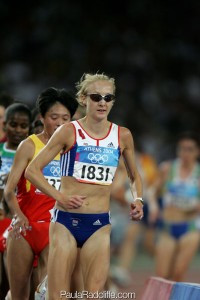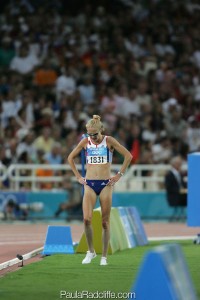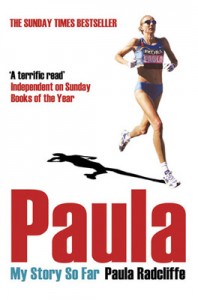Maybe it is true that I ran just to get to the start-line in Marathon but over the following days, even weeks, that wasn’t much consolation. I had gone there to realise a dream after years of hard work and I had been unable even to finish — a horror I could not have remotely envisaged.
In the aftermath, the same questions surfaced and resurfaced: why didn’t I realise my stomach was so bad and I was losing so much weight? Why did I let the stress get to me? Where did the injury come from? Could it have been avoided? On the day after the race I needed to get out of the athletes’ village. Gary (my husband) and I went into the centre of Athens, found a Starbucks café and met our friend, Karl Stith. Later Mum, Dad, my brother and his wife came and joined us. It was good to see them all and helped me a lot.
I felt like eating all the time, a reminder of how much I had taken from my body and of the refuelling it needed to do. Emotionally, I was still a wreck, fluctuating between feeling totally numb to not being able to stop crying, and back to questioning where it had all gone wrong.
We talked about whether or not to do a press conference. Gary’s view was that I didn’t need to do it until I was ready, but I felt that people deserved to hear the reaction I could give at that stage to what had happened the previous day. That Monday evening I went to the media centre and answered their questions as well as I could.
Before the marathon I had made the decision to keep quiet about the injury problems to avoid going to the start-line in a weakened position. If it had worked as planned, no one would have needed to know afterwards. So now I had to explain the full story but also did not want it to sound as if I were making excuses.
Another reason I couldn’t fully explain my performance was because the results from blood tests and the other tests weren’t back. I knew that, ultimately, the leg injury had not been what prevented me finishing. So I was still unsure about what exactly had made me feel so bad. Had it just been depletion or was there something else wrong with me? It felt possible that I had broken down much of my body mass for fuel during the race because my legs felt so sore — we were still trying to work everything out.
At the same time, I was dealing with very raw hurt and emotions. I also had to make a decision about whether I ran in the 10,000m but it would take us a few days to know whether I wanted to put myself on the line again, and also to see whether my body would be able to recover enough even to consider it. At this point, I was struggling to walk properly, especially down stairs. In my mind, I felt I wanted to run if I could, simply because I had so much frustration in me, so much desire to get out and run well and I knew that I had been in good enough shape to do so and had worked so hard to get there.
It came down to the fact that my next chance to run well at the Olympics was either in five days or four years. I didn’t want to watch the race and wonder what I could have done; I wanted to be in there and find out, to give myself every chance that I could, and not be always wondering if I had made the right decision. The only way to ensure there would be no regrets was to run — but first I had to be able to. I ran/limped for just 15 minutes that day and the next few days were just easy running and ice-baths.
My right ankle was also slightly strained but seemed to be improving. On the Wednesday night, 48 hours before the race, we went to the track. I needed to see if my legs could at least run at the race pace. I ran just two sets of 4 x 400m at faster than 30min 10km pace. As I discussed with Alex (Stanton, my coach) and Gary, this didn’t tell us much in terms of what I could do over 10,000m because it was too close to the race to do a testing session; but it didn’t tell me it was impossible, so I decided to race.
 My stomach was far more settled before the 10,000m than it had been for the marathon. In fact, inside I felt normal, but my body was tired. Warming up, I jogged the opposite way around the track and my ankle was very sore. I changed direction and it was a lot better. “That’s good,” I thought, “you only have to race this way!” We got out into the stadium and the atmosphere was amazing; there was a huge amount of support for me and I was really touched and more fired up. Yet, as I did strides, I had to acknowledge to myself that my legs were really tired. Please, I thought, just get through this one race for me, yet I knew it was a huge ask after the trauma of just five days ago.
My stomach was far more settled before the 10,000m than it had been for the marathon. In fact, inside I felt normal, but my body was tired. Warming up, I jogged the opposite way around the track and my ankle was very sore. I changed direction and it was a lot better. “That’s good,” I thought, “you only have to race this way!” We got out into the stadium and the atmosphere was amazing; there was a huge amount of support for me and I was really touched and more fired up. Yet, as I did strides, I had to acknowledge to myself that my legs were really tired. Please, I thought, just get through this one race for me, yet I knew it was a huge ask after the trauma of just five days ago.
During the early part of the race, I didn’t feel too bad. I stayed with the pace but knew the race hadn’t really started yet. When the surges began the little gaps were created and I couldn’t go with them, but to begin with I could maintain my pace and by staying mentally strong I could pull them back each time. By halfway I was feeling very tired but, worse than that, my quad began to tighten up and cramp.
I had promised Gary, Gerard (Hartmann, my physiotherapist), Alex, Bruce (Hamilton, the Team GB doctor) and all the medical people that I would not put anything at risk if I did not feel right. This wasn’t the marathon: this race wasn’t about struggling on until I could literally go no farther.
If I could have staggered to the finish in the marathon I would have done, but this was different. This was about me trying to salvage something from the Olympics and running for me. I was not going to run myself into the ground, risk doing serious damage to my body or health for the sake of finishing in a time and state that did me no justice.
I had already done enough damage to my body. It had taken enough. If the quad hadn’t spasmed, I probably would have soldiered on, but I was going nowhere in the race by that stage anyhow. Mum and Dad said afterwards they were shouting from their seats in the stadium, telling me to stop. Gary wanted me to finish because he was worried the media would crucify me if I didn’t. In a way he was right.
“I don’t care,” I said. “It is my body, my race and my life. It is up to me to make the decisions. I have no regrets, I went out there to get an answer and I got it.”
 The emotional impact of stopping in the 10,000m was nothing like what it had been in the marathon five days before. Unlike the marathon, I was prepared for the possibility of not being recovered enough to do as my heart and mind wanted, and when it happened, I accepted it. Of course it was still devastating.
The emotional impact of stopping in the 10,000m was nothing like what it had been in the marathon five days before. Unlike the marathon, I was prepared for the possibility of not being recovered enough to do as my heart and mind wanted, and when it happened, I accepted it. Of course it was still devastating.
I remember walking off in a dejected daze and almost getting killed by a javelin! I was angry with myself for being so inconsiderate and messing up their competition as well. Afterwards I spoke to television, radio and then the newspapers. Everyone was sympathetic and made it that tiny bit easier for me to talk about it.
After a devastating emotional experience, you seek comfort and inspiration from wherever you can. Something I read after the Olympics made real sense to me. It was in a James Patterson novel and I found it uplifting because it explained something I have long felt but never worked out into words.
It was about five balls: life is about juggling five balls in the air. They are health, family, friends, integrity and career/achievement. These balls are not the same; the important thing to remember is that the career ball is made of rubber but the others are more fragile.
You can take more risks with the rubber ball. You may try to throw it through higher and higher hoops because if you do drop it, it will eventually bounce back. Normally, this ball does not suffer long-term damage. The other four balls need to be looked after more carefully. If you drop one of these it will be damaged and it may even shatter.
It is a valid analogy because it symbolises what is important in life and should be remembered. So long as we have our health, integrity, family and friends we can overcome life’s hurdles. In sport, it is especially true that we take risks with that achievement ball. I throw it higher and higher and push myself to achieve all that I am capable of.
The last place I ever wanted to drop that ball was in the most important race of my life. Unfortunately it happened and now I have to recover. However, what is most important is that the other balls are safe and unharmed: I still have the best family and friends, they still love me and they have been invaluable in helping me to come to terms with, and then move on from, the disappointment of Athens.
My health and integrity are still intact. People may have questioned my integrity for stopping in two races but I know that I ran as far as my body could go in that marathon. I could go no further.
I do not doubt my ability to push past the pain barrier in future races. With a healthy body, you can achieve amazing things. When it is not healthy it will let you know and if you persist, it will shut down. It is important to heed these warnings and my body gave me no choice. For the 10,000 metres I did what was important to me: I gave myself the chance to run well so that I would never have to wonder “what if”?
Although it didn’t come off, at least I found out the answer and can live with that. I did what I felt was right, even though I knew that if it didn’t work out it would be criticised. When I knew there was nothing left, I didn’t risk long-term injury or inflict further damage on a battered body.
There were occasions, particularly during the aftermath of Athens and the endless dissection and criticism, when I wondered if I wanted to share a very personal story with the world. Then I thought of all the wonderful support and compassion I had received and of how all the people who’ve backed me deserved to know what happened in Athens and everywhere else along the way.
Also to know I’m OK, that I’ve picked up the pieces and am back to being me. I still love my running; I relish future races, am contemplating new goals and dreams and how best to achieve them. Above all, I’m back to being happy and I’m enjoying life.
Yes, I had a disaster — a big one. Yes, I was devastated for a while and the scars will probably always remain there somewhere, but writing this book has made me think about what I have already achieved in my career, what I have to be grateful for in my life and what is still there for me to achieve.
I had intended Athens to be a happy place to end my story. Life may not always work out the way we’d like, but I did not need Athens to deliver that message. However, one deep disappointment is no reason to change long-term plans nor to give up on my dreams. What happened at the Olympics makes me all the more determined to keep working — it inspires me to try even harder. This doesn’t mean the time immediately after Athens wasn’t difficult. I didn’t fully understand the biggest failure of my career. There were plenty of reasons, but I still couldn’t identify what made me feel so bad and so weak.
However, it never once crossed my mind that my career might be over or even that I was no longer the athlete I once was. I didn’t believe the marathon had beaten and broken me. Yet I had to face all of this and more thanks to the media’s and public’s reaction. Facing up to what happened forced me to be hard on myself; to question myself without fear of the answers. The process has been good for me.
I know I’m not a quitter. In Athens I had to fight against very challenging circumstances; I made some mistakes, didn’t handle some things well and paid the price. I’ll learn from the experience and come back tougher. I still have so much to achieve and have not become a lesser athlete.
I’ve so much left to do. Next year’s World Championships are a definite goal and I still want that world track title. In the longer term, the Olympic gold remains a goal. Yet, as well as the medals and titles, I also simply want to compete in different races and different places. It is what I enjoy doing: getting out there and racing. Winning isn’t everything to me — but running and giving my all is.
Every time I visit the hot sulphur baths in Dorres, near Font-Romeu (where I train) in the Pyrenees, I see, engraved in the rocks, the words: Notre plus grand gloire n’est pas de ne jamais tomber mais de se relever à chaque fois que l’on tombe. ‘Our greatest honour is not that we never fall down but that we pick ourselves up again each time we fall.’
This is so important. We should never be afraid to go after something that we want for fear of failure. We all need the courage to try. We may not get there straight away, sometimes we may never get there, but we must never be afraid to give all that we can to go after our goals and dreams.
Unless you put yourself on the line and give it your best shot, you’ll never know what you could achieve.

